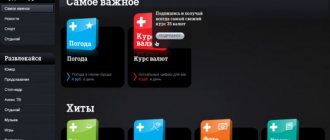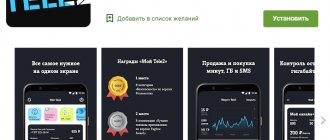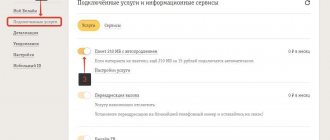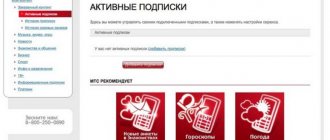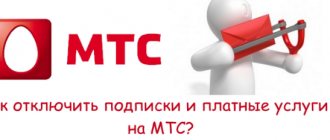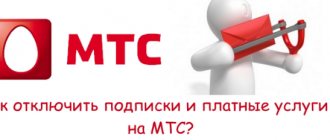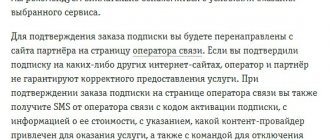Paid communication services often cause unexpected expenses that you may not even be aware of. The mobile operator Tele2, one of the Big Four, also commits similar frauds. Fortunately, disabling annoying and mostly unnecessary subscriptions is a quick and fairly easy task. In this article you will find several ways to find out subscriptions on Tele2 and how to turn them off. Fortunately, you can disable paid subscriptions yourself from your phone.
The best Telegram channel about technology (possibly)
Using dialer commands
To block paid services, you do not necessarily need Internet access. One of the easiest and fastest ways to manage Tele2 subscriptions is USSD commands. They work instantly, do not incur additional costs and are supported even on the most basic mobile phones.
How to check and disable subscriptions:
- In the dialer, enter the command *152# and click “Call”.
- Within 1 minute the “Tele2 Theme” menu will appear, inside it go to the “Subscriptions” section.
- In the pop-up menu, the operator will inform you about the availability of subscriptions with a monthly fee, or their absence.
- Use the command *152*0# to disable all messages and paid content.
Note: since “Tele2 Menu” is not always launched upon request, there is an additional command that allows you to find out about active subscriptions. In such a situation, in the dialer enter *189#.
Hidden mobile subscriptions Tele2: we figure out how everything works
Hello everyone, my name is Vladimir Kuzmin, I manage the iFreedomLab project (otherwise I was accused of plagiarism last time), we are investigating the business of hidden mobile subscriptions, we dealt with Megafon, studied Beeline, and now it’s time for Tele2.
A slightly shortened version, if you want to read the full version, visit our website. Some excess citations are due to requests from our attorney. Let's go.
Let me remind you right away that of the Big Four, Tele2 is the main fighter for honesty. This concept appeared immediately after the change of owners from Swedish to Russian in 2014.
At the beginning of 2021, advertising with Tele2 honesty ended: a new advertising concept was announced - “Other Rules”.
But honesty soon returned: in March this year, the company launched an advertising campaign focusing on the honesty of its new tariffs. The subdomain honest.tele2.ru (honest) has been opened on the company’s official website. Where, in large words, whites are told in black and white: “fair tariffs” and “everything is fair with us.”
What about subscriptions?
Judging by the comments, since at least 2015, subscriber complaints about subscriptions have regularly appeared on public platforms on the Runet. And they still don’t stop.
Hidden Tele2 subscriptions - do not exist, but work?
Having studied the complaints of users on the network, I want to note: the subscription kitchen in Tele2 is quite different from the quite similar, as it seems to me, practices of Megafon and Beeline.
The Tele2 operator is developing an ecosystem of services, many of which can really be useful to subscribers. For example, a partnership with the Megogo service.
A misunderstood service was the Educational Portal from Tele2. His discovery was covered in many media.
The educational portal is filled with courses from well-known platforms GeekBrains, CSC, Stepik and Lectorum, for access to which Tele2 subscribers must pay 9 rubles per day.
I experimented with course subscriptions and a few questions arose. There are two main ones. First question: why do you need to pay 9 rubles a day for courses, many of which are available for free on other sites? The second question is more difficult.
The course “Gambling Theory of Probability” (why is it in the “Personal Growth” category?) on the Lectorium website costs 2,000 rubles. It is available on the Tele2 website at no additional cost as part of a subscription for 9 rubles per day. The course is designed for 2 weeks, that is, it will cost the student 126 rubles, that is, the discount will be 93.7%. Moreover, as part of your trial subscription, you can download all the videos from the course for free.
I don’t understand the origins of the unheard-of generosity; there is no information about the partnership. Therefore, I sent requests, first to GeekBrains and CSC, with a request to clarify the terms of cooperation of these platforms with Tele2, and received a strange answer from GeekBrains:
But even the dubious subscriptions that I came across with Tele2, it seems to me, are noticeably different from the operators that came under surveillance earlier. If their hidden mobile subscriptions look more like the tail of a lizard, which can be discarded with the words “it seemed to you,” then Tele2’s subscriptions even from third-party developers are designed in the operator’s corporate style, they can be found in the official catalog. Some of them even work, ranging on a scale of acceptability from “compilations of freely available content on the Web in a cute design” to a visually “good service.”
Although, no matter how wonderful the services and designs are, the main thing is that the subscription is voluntary. And with that comes mistakes.
Like the operators already discussed, Tele2, judging by the reviews, practices all the already well-known methods of dubious sales to customers of services they do not need.
All the good old classics are available in full, but the company also allows itself creative rethinking: not only new names for everything old, but also the introduction of brilliant know-how in the development of dubious services.
The listed features make us think, firstly, about the operator’s much greater attention to the subscription business compared to Beeline or Megafon, and secondly, about the leadership role in it.
Another important feature of the story with subscriptions from Tele2 is their maximum confusion, contrary to the permanently declared honesty and simplicity.
For the tests, I used a Tele2 SIM card, bought on occasion in Ryazan, since according to rumors, Moscow and St. Petersburg are less susceptible to subscription evil.
When purchasing it, no additional manipulations/requests/settings were made. Already at this stage of the study, the first incident occurred. Of the two services connected in the “free trial period, then paid” format, “Living Balance” politely turned off after the free period expired, while the second one, “My Assistant,” remained and turned into a paid one. Well, to make it even more fun: if “My Assistant” (1 rub./day) is turned off, “Who called” (60 kop./day) will automatically connect instead. Watch out, subscriber.
But these are the operator’s own services. How can you get a subscription to some terribly useful content?
How to catch a dubious subscription, version from Tele2 Before this, the most common way to catch a subscription was to visit a disguised subscription site. Only in some cases the subscription was somehow found on its own. But with Tele2, no one seems to be able to explain where in the wilds of their personal account the subscription came from.
What’s even more interesting is that, judging by reviews from Tele2 subscribers, users can get a subscription even if their SIM card has been lying on the table separately from the phone for a year.
Judging by popular reviews, Tele2 subscribers are faced with all known methods of obtaining hidden subscriptions:
- sudden SMS about connecting to an unknown service;
- “typos” in USSD requests - we especially liked this point. You enter the wrong short number and they sign you up for the service. Because you are subscribed to the service if you send an SMS to any unoccupied number.
- unexpected service connections;
- banners with a built-in subscribe button (classic);
- “random” subscriptions through the service with modal windows “Tele2-Tema” (which in some cases is not even connected);
- an offer to connect to a paid service based on service messages such as checking your balance;
- inability to disable paid subscriptions;
- the connection of paid subscriptions with an initial free period mentioned above and widely practiced by the company;
- and, finally, a subscription has simply arisen from nowhere, which the subscriber learns about only when he discovers that money has disappeared from the account.
It is the last method that is the most common and most creatively rethought by the Tele2 operator, judging by reviews on the RuNet.
Here are the latest stories: April of this year, here it is May, here it is June, here it is already July.
Tele2's subscription business is organized in an extremely chaotic manner.
Chaos number 1. Subscriptions
Forbidden word
How to make sure there are no paid subscriptions? Ban? Protect? Stop calling subscriptions subscriptions!
In the vast majority of the found offer agreements, they are additional and/or have a note that this “service is provided on a subscription basis.”
The wording “Subscriptions” indicating expenses for them is found, but more often subscribers see some kind of “periodic write-offs”. In the reviews we came across the wording “One-time write-offs”. And it happens in the absence of “Paid ones - right next to you. Subscribers generally mark multiple menu items in their Personal Account, which may contain paid services.
I subscribed to the “Auto Fines+” service. It costs 9 rubles per day. There is also simply “Auto fines” for 4 rubles per day.
For this money, the subscriber gets what he can get for free in other services, but for the money and in a nice little design. The traffic rules as amended in 2021 are especially “useful”.
Then I checked my personal account:
There are no connected paid services, there are PERIODIC CHARGES. Where do “paid services” end and “periodic charges” begin?
The contract, meanwhile, contains an unambiguous term - subscription.
Let us remind you what they say about themselves at Tele2. “In addition, Tele2 makes connecting services as transparent as possible for customers. In their personal account - on the website and in the application - subscribers see a list of connected services and can easily manage them. Contacts regarding content services to the support service are minimal, and in any case, we always resolve the issue in favor of the client,” said the Tele2 press service.
Additional services: shaken and mixed
This is no longer about hiding payments for dubious services in different sections, but about the intricate systematization of services. Tele2 is developing an entire ecosystem of services for its customers; however, contrary to the concept of “ecosystem”, which by definition implies the presence of a certain “system”, offers from Tele2 are scattered completely unpredictably across the most varied nooks and crannies of their vast economy of services.
So, in the financial services section, among the listing of payment systems and financial products, I found offers such as “husband for an hour” and online veterinary consultations.
Chaos with music! In addition to mysterious services, the company sometimes presents even services that are quite familiar to the mobile communications market in such a way that I am somewhat confused. So, the simplest service for replacing beeps with music is organized in such a way that I spent a day trying to figure it out. There are a dozen different options for it, which are regulated by three offer agreements (!). In addition, there is also a free mobile application “Gudok”. But with the same mixture of free and paid services. Some options only work in combinations. Other paid options can be enabled automatically (but cannot be disabled in the same way :)). And all this with a bunch of conditions and reservations. And the cherry on this cake: additional paid services on the site are offered to be included with a FREE request:
Yes, yes, “Gudok+” is an additional paid option to the paid one, which, as you see, Tele2 offers to connect with a free command.
Let's play paid/free
Intrusive messages with offers to connect something add color to the communication between subscribers and the company. We are talking about pop-up modal windows with a wide variety of offers, well known to Tele2 subscribers.
These “windows” work using SIM Toolkit technology (built into the Android OS by default), and Tele2 has several services that are built specifically on it. Many people are familiar with these types of notifications:
For example, this offer is on a screenshot from the “Tele2-Menu” service - any Tele2 subscriber will find it in the so-called SIM menu (yes, you can subscribe to paid services there too) and it is free. But the offers he sends you are paid. Found 166 current offers for “Tele2-Menu”. “Tele2-Theme” works on the same principle - and there are almost 400 proposals. According to the offer, they are sometimes paid, sometimes not. And there is also “Tele2-Guide”. And if you carelessly connected one of these free services, then such a kaleidoscope of all sorts of things is constantly spinning before your eyes with the risk of accidentally purchasing it by unsuccessfully swiping the modal window.
Tele2 subscribers can run into paid services in different places, which they sometimes don’t even suspect. The company does not lose the opportunity to offer its clients something additional and paid, using the maximum of technical, legal (more on this below) and social engineering developments.
Subscriptions that don't work So, subscriptions aren't really subscriptions; they're legally complex and confusingly described. Everything would be fine, but their performance is also low.
The Tele2 application for smartphones has an “Application Catalog” from AppsClub. As part of the service, subscribers are offered to install applications for themselves - games, fitness assistants, etc. Beeline has the same service, I already checked it and was somewhat outraged by it, but at least it worked.
What they offer: install a catalog of applications with a daily fee of 15 rubles. And use very expensive games for free, costing as much as 9,000 rubles, but with a 100% discount. True, most of the applications can be downloaded for free from PlayMarket. AppsClub is owned by content provider BeMobi International with offices in Sao Paulo, Oslo and Odessa.
The prices for simple mobile applications were amazing. Not everyone is aware of the prices of video games; for 10,000 rubles in Moscow on the marketplace you can buy a Nintendo Switch Lite game console with a couple of games. And although there are mobile applications for Android for that kind of money, they are usually designed to help owners make money: like manuals for dentists, veterinarians, or reference books on metallurgy.
I couldn’t pass by my friend from the Beeline AppsClub investigation and signed up. Something went wrong here. The subscription was completed, but the promised SMS with details did not arrive. But I received an email notification that I had subscribed to a loyalty program from Tele2 called “More”. Why? On what grounds? Where is my application directory access?
I couldn’t figure it out and contacted the technical department, which also couldn’t comment on what was happening. Dialogue:
Although, as a suddenly imposed subscription, it works quite well: subscribers talked about suddenly connecting to this particular service.
Top secrecy Here I decided to clarify the full list of Tele2 subscriptions and asked a colleague to ask this question to techno. The answer was unpretentious:
I managed to find a list of short numbers with a description of their services (subscriptions are tied to short numbers, like other services): in Tele2, like other operators, subscriptions are attached to short numbers, and on the website you can check these numbers - that’s how we We calculated about 4.5 thousand Tele2 partner services that have information about themselves on the company’s website. By the way, we are sharing the file.
By the way, even here there was not information about all the services that are right now on the company’s website and in the offer agreements and for which there are short numbers: I couldn’t find, for example, the “Sports Portal” developed by the “Mobile Content Factory” and presented on behalf of Tele2.
In general, it seems that the complete list of subscriptions from Tele2 is a secret secret.
So, over 4,500 subscriptions! Some of the numbers on the list are serviced, for example, by banks or online cinemas, but the lion's share are subscriptions from content providers.
You can receive all kinds of subscriptions from them in a variety of ways: through SMS, USSD and voice requests. Among them are a lot of content providers already known to us from other investigations who are actively engaged in the business of dubious subscriptions.
Both the nice design and the fact that many services from partners are made in Tele2’s corporate style, in our opinion, are not at all an advantage in this case. Visual uniformity rather indicates how powerfully Tele2 is integrated into this business and how much it allows its partners.
And here we come to the main thing - the partners. Because all Tele2 services are made by partners, and Tele2 does not hide this at all.
Chaos number 2: suppliers and partners
According to Tele2, the company is very strict in choosing partners. The company even has a whole code of ethics for partners.
Many of Tele2’s service providers have existed in the mobile content market for many years and are widely known in narrow circles: A1 Systems LLC (it accounts for almost 1,000 of the subscriptions we found); LLC "TD MEDIA"; Bradbury Lab LLC - the creators of the quite suitable Tele2 TV service and other working services (among the founders, by the way, you can find Nikita Mikhalkov); LLC "Mobile Content Factory" (but these cannot be found by short number, but can be found in the offers); LLC "IMTehnologii"; LLC "INTEC GLOBAL"
Despite several quite adequate developers of modern services, most of them are real veterans of the subscription business, or, to put it complimentarily, the mobile content market. They have existed for many years, some since the 2000s; they grow and develop along with this market. Some of them, for example, periodically appear in some investigations of the subscription business.
There is generally an interesting story with Tele2 TV from Bradbury Lab LLC: judging by the reviews, it is generally a workable service, you can install it by downloading the corresponding application on Google Play or the AppStore. True, in the description of updates in the AppStore it is still called Amediateka. Yes, and subscribers complain that first they receive a subscription, and only then download the application to get rid of this subscription. You can’t help but think: perhaps this is why the application has more than a million installations? How exactly was such a high figure achieved? Which brings us back to the most important conclusion regarding the correctness of the provision of mobile services: no matter how excellent the service, subscription to it must be voluntary.
Finding any information about affiliate subscriptions and how they work is a rather non-trivial process. For example, technical support reacts strangely to questions about services and their owners:
Affiliates: all inclusive!
The classic option for catching a hidden subscription is to accidentally click on an advertising banner or go to a website where the subscriber is already welcomed with open arms and transferred to a landing page. We decided to check if this scheme works for Tele2? And it seems that the classic option with affiliate programs for quietly imposing hidden subscriptions is also in use at Tele2.
Here is the review from “RedMusic” who “caught”:
Chaos number 3. This is not a subscription, but mobile commerce
This method of “earning money” makes you ask the question: “Was it possible to do this?”
So, attention:
Now, in addition to subscriptions and periodic debits, the subscriber’s money goes to some kind of cash payments/mobile commerce. What's the bonus? The subscriber pays from his mobile account, but this is not a subscription, so the content account does not insure or protect against it.
Let us recall that a mobile subscription in the classical sense is content/service provided by a partner and infrastructure (billing, short numbers) provided by the operator. To pay for these services, a content account was invented.
What do we have in front of us if not a mobile subscription? It's a "subscription that works through mobile commerce." The operator provides billing and short numbers, but in the case of mobile commerce, a different payment method is used, different from a classic mobile subscription - a money transfer from a mobile phone account through a non-bank credit institution.
ELECTRONIC MONEY OPERATOR (EMOS) is a money transfer operator that carries out electronic money transfers without opening a bank account (electronic money transfers). In particular, in the example above, OEDS_10 is LLC RNKO “United Cash Office”.
Therefore, where you lost your money, write there about a refund. The operator has nothing to do with this. GENIUS!
True, subscription occurs through the resources of the operator itself, unsubscribe too... But this is a third-party resource, of course.
We found a whole group of resources, complaints about which Tele2 can read in their own groups on social networks. But these are not mobile subscriptions, right? So it doesn't count, right? In our opinion, it still counts.
But how convenient it is to say that you have nothing to do with it:
Domains of Difficult Fate
Tele2 subscribers actively “purchase” the services of strange information services within the “mobile payments” option. Since these are not mobile subscriptions (although payment is per day of use), the content account does not save them, there are no notifications, and the joy of disappearing money does not immediately overtake users.
We have identified several domains for which Tele2 subscribers pay dearly to subscribe to services:
- https://checkyour.name/
- https://infoportal.me/
- https://rudatingclub.com/
- https://jinfile.com/
- https://x-dating.name/
- https://shtrafoff.net/
- https://pushdata.net/
- https://myinfo.name/
But there may be many more such “services”; we do not expect that we have found everything. They are not in the list of services available to subscribers.
The history of these domains is long, it is full of events, changes of owners, and has seen temporary oblivion, but in 2021 they all emerged from oblivion, and the data of all domains now includes the Cyprus company DANESCO TRADING LTD, director - Anna Pravdenko. It seems that this company is simply covering up the name of the real beneficiary, but why does Tele2 allow a situation in which subscribers of such a large state-owned mobile operator buy something on such resources?
And then it’s more interesting, because the user agreement of these services shows us not a Cypriot company at all. The user enters into an agreement with Viva LLC or Helgi LLC (both companies are from Nizhny Novgorod).
The beneficiary of Viva LLC is Vahe Ambartsumyan. Viva has good income, although the expenses for 7 employees are quite high:
Helgi LLC also earned more than 100,000,000 rubles last year.
Viva LLC sometimes acts in a user agreement on its own behalf (in the case of the checkyour.name domain). And sometimes both Viva and Helgi operate on the basis of a license agreement with LemonBit Limited, a legal entity registered in Ireland.
I bought an extract from the Irish register:
The owner of LemonBit is an EU resident, Sergey Simakhin, lives in Riga. LemonBit's income is "modest" - only 4 million euros per year.
We are moving to Riga. There, Sergey Simakhin owns half of a certain OneClick SIA, a banner network https://one-click.lv/. Who owns the other half of OneClick SIA? That's right, Vahe Ambartsumyan. Which, as we remember, is the beneficiary of Viva LLC. This is a simple scheme.
LemonBit, by the way, has 5 more applications in the AppStore: CheckName, Dok2PDF, Triplook, JinFile.com and FileXload, they also work in the pair “Helgi” + LemonBit and “Viva” + LemonBit.
Let’s assume that the scheme is simply needed for seamless transfer of money to the European Union. And Tele2 knows nothing about this, because it is a third-party resource.
But that's not all! To unsubscribe from a useful subscription, for example, from checkyour.name, you need to send an SMS to the short number 659. This number belongs to the provider INTEC GLOBAL, Information and Entertainment. Service type - subscription. We were just wondering how “Super-oh” stands for. Super useful? Excellent description of the service.
In total, INTEC GLOBAL includes 96 subscriptions on the Tele2 website; in 2020, the company earned over 400 million rubles.
So to subscribe or not to subscribe? What is this complicated scheme with legal entities in the EU? How can Tele2 not be in the know if you have to unsubscribe through its own numbers?
Why does an operator with state participation allow incomprehensible “multiple movers” from different legal entities, some of which are not in Russia at all, to work with its subscribers? Considering that his subscribers complained about these companies from Ireland more than once or twice?
More global questions, as often happens, are rhetorical: if there are so many complaints, then why not disable cash payments for all subscribers by default, but enable them for those who really need them upon request? Rrraz - and subscribers are under reliable protection! Or, for example, request SMS consent? It’s not difficult, but it will also protect the subscriber.
The listed domains of difficult fate from Helga, Lenmonbit and Viva are not a complete list of what subscribers may come across.
For example, here is the service https://adfix.pro/, which Tele2 subscribers “stumble upon” as part of the same mobile commerce. The site, by the way, states that they also work with Megafon and MTS, but we were unable to connect to it using a SIM card from this operator. The same thing happened when trying to use an MTS SIM card.
The service is useful in all respects, I especially liked the stock photos used as avatars for users who highly recommend the service.
On the Adfix website, we found out that the user enters into an agreement with an individual entrepreneur registered in 2021. Apparently, individual entrepreneur Shorin A.A., with whom the subscriber enters into an offer agreement, works tirelessly on his product.
Tele2, when asked who owns the AdFix service short numbers 1591 and 2583 (they are not in the database of 4,500 numbers, but they are listed in the offer),
Guys, do you know what’s going on there?
Chaos number 4. Protection
In the fight to protect their balance, Tele2 subscribers also face a lot of additional obstacles. Some of the services are mobile commerce, which can be disabled. But sometimes subscribers use it and don’t want to turn it off. What about protection from classic subscriptions? There are protection services, and they fully support the Tele2 style: there are many of them, they are in unexpected places, they are not clearly described, and what they ultimately give to subscribers is also not very clear. The uniqueness of numerous services for protection against paid subscriptions and the peculiarities of their work were also admired by Tele2 subscribers on popular sites of the Runet: in the Personal Account there is, for example, the option “Protection against accidental subscriptions” (free) and “Protection against paid subscriptions on the Internet” (2 rubles ./day). In addition, subscribers are offered some kind of protection for 4 rubles. in a day. And also “Safe Mode” for 6 rubles. in a day.
We also tried to block unwanted subscriptions by choosing the “Safe Mode” system for 6 rubles:
Indeed, we need to be careful: they only disconnected us from some WEB subscriptions, whatever that means.
And according to the testimony of affected subscribers, the bans are so cleverly organized that they simply do not work.
For example, Tele2 subscribers can refuse the annoying story with modal windows, but through the SIM menu, and not in their personal account.
What kind of content account is this?
Those affected by hidden mobile subscriptions are often advised to connect a content account.
Let us recall that the concept of a content account was introduced by law in 2014 precisely to combat hidden subscriptions. According to the new version of the law, all additional services of cellular operators must be paid from a special content account, which the subscriber must specifically open and purposefully deposit money into. If there is no account or it is empty, no paid service can be provided.
By the way, a content account in Tele2 can be connected only in the office and only with a passport, unlike the same Beeline, where this can be done by a command online.
In a previous investigation, I noticed that fees for some Beeline subscriptions, even affiliate ones, are debited from the main account and the content account does not work. Tele2 has qualitatively rethought this.
The explanation is in the offer agreements (they are also the rules for the provision of services). They are designed in such a way that the subscriber does not have the chance to refuse to pay for an additional service: everything is provided there so that no content account interferes with the debiting of funds from the subscriber’s main account.
According to some offers, additional services are paid immediately without charges from the main account:
Public offer, Rules of provision for Tele2 Operator Subscribers, clause 10:
Payment for “Subscription” options is carried out at the expense of previously advanced funds for communication services and reflected in the Subscriber’s personal account.
True, compliance with the law with a content account will also not be a panacea - the offers given on the website suggest that money will be debited from the main account if there is no content account: Provision rules for Tele2 Operator Subscribers, clause 9:
The provision of the Service is carried out on a subscription basis: the fee for the Subscriber for using the service is set at 9 (nine) rubles 00 kopecks per day, including VAT. The fee is debited by the Operator from the Subscriber’s content personal account, and in its absence, from the Subscriber’s main personal account daily for each day the service is provided.
But, it seems, the best thing is that many offers contain permission to drive the subscriber into debt with subscriptions:
Rules for provision of Tele2 Operator to Subscribers (hereinafter referred to as the Subscriber), clause 13:
If it is impossible to debit funds from the Subscriber’s personal account for use in full (due to the lack of sufficient funds in the Subscriber’s personal account), it may be provided to the Subscriber with subsequent additional tariffs.
conclusions
A very important remark in the context of the topic about virtual operators, like Tinkov Mobile and Sber Mobile: “In 2021, Tele2 becomes the leader in the development of MVNOs in the country. An MVNO is a virtual mobile operator that uses the infrastructure of another operator to sell services under its own brand. Tele2 is the only “MVNO factory” in Russia, proving that a bank, a supermarket chain, a football team, a blogger and a media personality can have their own operator. Tele2 launches virtual operators with Rostelecom, Sberbank, TransTelecom, Tinkoff Bank. In December, Tele2’s MVNE platform starts operating: it allows you to put the creation of virtual operators on stream,” this is a quote from Tele2’s own blog.
Let me remind you of a fairly well-known fact: MVNO operators do not suffer from dubious subscriptions. Neither those that work on Tele2 networks, nor Yota, which works on Megafon networks.
Those. In some incomprehensible way, virtual networks deployed on the Tele2 technical base can block absolutely any subscriptions.
This can probably only be explained by the “social responsibility” of large operators to subscribers, which they so love to report on their websites, in annual reports and at press conferences.
Therefore, as a conclusion:
- It’s possible to live without hidden mobile subscriptions (and mobile commerce), and in my sincere opinion, even necessary. This is proven even by virtual operators operating on Tele2 networks.
- The fiery honesty in the marketing slogans of mobile operators is apparently not related to the policy in the field of hidden subscriptions.
- The hidden mobile subscription schemes practiced by other operators, as we have seen, also apply to Tele2.
But the use of mobile commerce to create “subscriptions 2.0” seems to us an alarming symptom, so far we have not seen any complaints from subscribers of other operators, but if you have encountered this, write to
Although the operator denies participation in this, in this case it is not clear how these “services” continue to exist for several days, despite the flow of complaints about them from subscribers.
[my] Subscription Cellular operators Tele2
Through the mobile application "My Tele2"
If you track changes in tariff and often use the “My Tele2” application on your smartphone, then this is the most convenient method for you. The option is located right on the main screen: go to the “Service Management” section - paid services will be displayed at the top of the list in the “Connected” tab. Of course, provided that they are available and activated by your phone number.
In the “My Tele2” application you can find out not only current subscriptions and how much they cost, but also turn them off literally with the click of one button.
Also note that immediately after Tele2 paid services there may be “Recurring charges”. In this case, we are talking about subscription services from third parties: “Weather”, “News”, “Currency Rates”, “Horoscope”, “Anecdotes”, “Dating”, “Healthy Lifestyle Portal”, “Personal Trainer” and others. Usually no one ever uses them, especially in today’s time, so it’s worth turning off and forgetting.
About the service
So, what is this Tele2 topic? This is one of the sections of the Tele2 menu application, which is automatically downloaded to subscribers’ mobile phones after an operator’s SIM card is inserted into it. We are talking about an updated version of “Menu”, which is pre-installed on new SIM cards. Moreover, you cannot download the latest version of the program; it will become available only if you order a reissue of your SIM card.
It is important to know how to unsubscribe from paid subscriptions.
Using the application you can get the following information:
- News of various types. Sports, business, culture, etc.
- Weather forecast.
- Information about exchange rates.
- Aphorisms, jokes and other entertaining content.
- Multimedia content (video, photo, audio). Also read the article: “Content - what is it in a Tele2 phone.”
This option itself is free. When it is activated or deactivated on your device, no money is withdrawn from your account. The content provided in informational SMS is partly paid, partly free. If you subscribe to paid messages, the very first one will be informational, indicating the cost. You may also be charged for communication and data transfer in the amount determined by the tariff plan.
Please note: we are not considering the question of how to connect the Tele2 theme. The application is pre-installed and active by default. To use the service, just enter the Tele2 menu, click on the item with the appropriate name and select what you need.
In your personal account on the website
If it is more convenient to check the list of paid services through a computer or laptop, then the web version of your personal account is suitable for you. Log in to the official website tele2.ru, in the main account menu, select “Manage services”, scroll down and click on the “My services” item.
Check the list and disable unknown or unnecessary ones if necessary. The button located opposite the name will indicate how to disable it.
Alternative option - contact the salon
In the nearest salon, specialists will tell you about paid subscriptions, the conditions for their provision and how to disable them. When contacting in person (a passport or other identification document is required), the operator’s employees will provide free detailed advice on any issue. A list of available salons by region is on the official Tele2 website, go to “Sales Offices” below.
Mobile operator Tele2 has launched a new service that will be useful to absolutely every person
Miscellaneous 10/09/2021 | 0
Telecommunications services are becoming more and more in demand every day and irreplaceable in terms of their totality of qualities, and now, to the delight of many people, something happened that no one even expected, because they could not even imagine that something like this would ever happen. The fact is that the federal cellular operator Tele2, being a member of the Big Four, considered it necessary to launch and offer to connect to each person’s phone number one new and extremely useful service, with which absolutely every person will be satisfied in one way or another, because otherwise in this there cannot even be a specific case. By starting to use this option, the subscriber gets the opportunity to easily and simply change his life for the better.
The new opportunity is a completely unlimited mobile Internet, and it is provided, which is no less important, at the highest possible speed of all that can be achieved. The bandwidth of the Internet channel is really not limited at all, and it can be achieved within the limits of as much as 300 Mbit/s. You can spend an unlimited package of Internet traffic on everything that can come to your mind, that is, you don’t even have to worry about this, and this, of course, is a very big and extremely significant plus, which can literally please you very much. each person. Having started using this option, the company’s client has the right to count on many different benefits.
There is unlimited traffic in more than 82 constituent entities of the Russian Federation, that is, you can move around the country and not limit yourself in any way, which, in turn, cannot be considered anything other than a huge huge plus that can pleasantly and greatly please anyone person. However, this is not all that the subscriber has the right to count on. In addition to the new service, the client of the mobile operator is consistently offered an unlimited package of Internet traffic every month for everything that can even come to mind. Using such a service, you can once and for all forget about the costs of paying for telecommunications services, because there will be an infinite amount of Internet traffic provided.
The new option is an unlimited traffic package, and you can use it for everything that you can think of. By starting to use this opportunity, every person can easily and simply change their life for the better, making it as easy and simple as possible. And so, to the joy of very, very many people, a very real miracle happened, with which everyone will be satisfied in one way or another, because in this particular case it cannot even be otherwise. So, in particular, the telecommunications company Tele2 considered it necessary to offer all residents of Russia real unlimited for only 100 - 200 rubles for one month of use, that is, it costs extremely little, which makes it accessible to every person.
Earlier it was reported that Russian President Vladimir Putin put an end to the mobile operators MegaFon, MTS, Beeline and Tele2.
Join us on Google News , Twitter, Facebook, VKontakte, YouTube and RSS to stay up to date with the latest news from the world of future technologies.
AKKet.com Telegram channel
Receive notifications about new materials directly in the messenger - on iOS, Windows, Android and Linux.
Tele2InternetOperatorsRussiaServices

